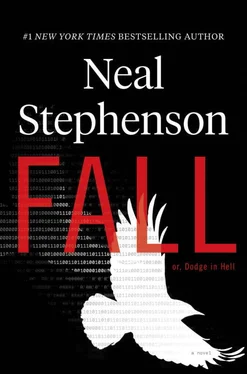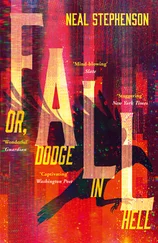All of which was a detail little noticed since Defender of El and many of his angels had fallen to the ground and were lying dead or broken on the plain between the anvil and the Fastness.
Another rank of angels wheeled into position above, ready to renew the attack. Defender of El lay dead. All eyes turned to El, who hovered a little distance above the ground at the opposite end of the battlefield, near the wide bridge already carpeted in green and growing things.
“At your command, Lord El!” shouted an angel who seemed to have assumed command.
The same words were echoed a moment later by Sooth below. She had raised her sword as if to signal a charge.
El hesitated.
The ground was shaking, but El did not know it because his feet were not in contact with the Land.
The Chasmian vaulted out of the gorge behind him. No longer impeded by its massive shield, it lashed out with both arms and wrapped them around El’s form from behind. In an effort to escape the bear hug, El became mostly a thing of aura. The two forms became intermingled as they struggled and writhed at the brink; then, with the slowness of a great tree that has been cut through at the root, they toppled into the Chasm and disappeared.
“Hold your fire,” Egdod commanded, and took to the air again, flying in a broad circuit over the battlefield. Which was now merely a field, since it was suddenly clear to all present that no battle would be taking place on the Anvil Plain this day. To Sooth he spoke: “Your task has been accomplished. Not the one El had in mind for you, which was false. But the one I ordained, which was to see what you just saw. You may complete it by grazing your mounts on the sweet grass and then riding home to tell everyone you see—Autochthons, Beedles, Sprung, and wild souls of all shapes—what has here occurred.”
He then beat his wings powerfully and mounted up into the air, where the surviving angels were arrayed in their echelons. Many were too bright to look upon, but they dimmed when Egdod commanded them to sheathe their swords and they did so. “Your weapons were stolen from Thingor,” Egdod said. “He will collect them below. If you regret giving them up, console yourselves with the knowledge that they are useless against what Thingor has conjured up in the ages since. Go out into the Land and do useful things. One day I shall come back to my Palace to inspect it; I expect that everything will be in good order there.”
Swooping down low over the Fastness he spoke to all within and around it: “I have business in the Firmament. Before long I shall return. You know what to do.” And pulling up high, he made a pivot in midair, folded his wings, and dove headfirst into the center of the Fastness. Those standing outside, who saw him plunge out of view and who did not know that place’s secrets, might have expected to hear a crash as he plummeted headfirst into the ground. But those within saw him fall into the chaos upon which the building had been founded.
The door of the Fastness opened. A frail old lady emerged, supported to either side by younger souls. She tottered down the long stair, pausing more than once to rest. The ground before her was strewn with fallen angels dissolving. The stuff of which they had been made began to converge upon the old lady, and she began to gain weight and strength from it as she drew it into her form.
Zula had fallen out of the habit of watching Bitworld, because, by and large, it happened too fast to be really intelligible. She wondered if she was senile—or if she seemed that way. She had a memory of a Thanksgiving, more than a hundred years ago, when she and some of her cousins had been hanging out in the TV room of the Forthrast farmhouse in Iowa, passing the time with a video game, and she had looked up at some point to see Uncle Claude, spry and curious at eighty-three, standing in the doorway looking at the big screen perfectly aghast. It was hard to tell how long he’d been standing there trying to make sense of it all. But there was clearly a feeling that some combination of age and culture shock had shifted Uncle Claude into a lower gear than all the other people in the room, that his clock was ticking at a slower rate than everyone else’s.
When Zula—or anyone else in Meatspace—watched Bitworld, that was, of course, literally true. The Time Slip Ratio had veered all over the place during the century that Zula had been doing this job. But in the last couple of decades, since ALISS had gone orbital, the trend had been toward greater speed. Freed from earthbound limitations on how much power could be generated, how much heat dissipated, how much fiber laid, and how many resources quarried out of the ground (for they built everything out of asteroids now), they’d kept pace with demand and then some. Consequently time in Bitworld had, on the whole, sped up. It was no longer like watching a human drama acted out in real time. More like an ant colony.
So she had stopped looking at it. Oh, she could see it perfectly well. Presbyopia had given way to cataracts, organic lenses replaced with artificial ones. The retinas she’d been born with had been swapped out for new ones, grown in a lab, hooked up to her optic nerve by a microscopic robot surgeon. For a while, her brain’s visual cortex hadn’t known what to make of the new and improved signals coming in on that channel, and so she had had to learn how to see again—a difficult thing for one of her age, but made easier by neuroplasticity medication derived from the stuff Maeve had experimented with ages ago.
So now Zula could see every bit as well as she had been able to when she had been seven years old. It was just that she would rather use that faculty to look at things in the real world. When gazing into the land of the dead, she felt that same bafflement, the same disconnect, as Uncle Claude.
Uncle Claude had stood there anyway and gamely tried to bend his old mind around it because he had known that the youngsters in that room were his kin and that this stuff was important to them. Likewise Zula was aware that during recent days (as time was measured in Meatspace) momentous things had been going on in Bitworld involving the processes that had been booted up there to simulate the consciousnesses of her daughter, Sophia; her friends Corvallis and Maeve; and perhaps others as well. They had been moving around the Landform rather a lot, and interacting with one another, and Sophia had terminated a few other processes. Zula was aware that this was all being watched with great interest by the dwindling population of living humans who still existed on planet Earth.
So she walked down to the office one lovely fall evening to see what all the fuss was about. She could walk—or run, for that matter—all day if she wanted. Of course, it was Fronk whose feet actually contacted the ground, whose joints took her weight, whose sensors and algorithms saw to it she didn’t keel over. She had been wearing Fronk for decades now and would die pretty quickly if she doffed it. She could not have walked, or even stood up, without it. She wore it to bed. It was her bed.
South Lake Union had held its own as a place where biological humans physically came together to work on things. Nowadays, mostly what they worked on was the high-level management of ALISS. Of course, the bulk of the actual work was performed by robots in space. None of those was even remotely humanoid. Their AIs were tuned to analyze space rocks and to solve conundrums relating to scheduling of tasks, logistical coordination, and resource allocation. You couldn’t talk to them, and if you could, it would have been like having a conversation with a shovel. The humans working below on the surface of Earth were just keeping an eye on things, looking way down the road, making sure that the robots could go on finding more space rocks and fashioning them into more robots until they ran out of space rocks. Then, if they needed to, they could begin busting up unused moons and planets, or go out to the asteroid belt between Mars and Jupiter, where there were many more rocks. The end state of all this would be a Dyson sphere: a hollow shell of rock and metal that would capture all of the sun’s power, spend it in computation, and radiate the waste heat into the cosmos as dull infrared light. But it would take a long, long time to get to that point. Long enough for every human now living to die of natural causes, even if they all used as many life-extension technologies as Zula. Earth, or at least a patch of Earthlike ecosystem, would be preserved as a kind of park, and bio-humans could live on it, if that was what they were into.
Читать дальше

![Нил Стивенсон - Криптономикон [litres]](/books/23868/nil-stivenson-kriptonomikon-litres-thumb.webp)






![Нил Стивенсон - Падение, или Додж в Аду. Книга первая [litres]](/books/392729/nil-stivenson-padenie-ili-dodzh-v-adu-kniga-perva-thumb.webp)
![Нил Стивенсон - Лавина [litres с оптимизированной обложкой]](/books/414066/nil-stivenson-lavina-litres-s-optimizirovannoj-ob-thumb.webp)

